Introduction
Rabbits are beloved pets known for their gentle nature and herbivorous diet. But some pet owners might wonder, do rabbits eat mice? This question may arise from unusual behavior or simply curiosity about what rabbits might do in the wild.
Understanding a rabbit’s natural diet and behavior is essential for ensuring their health and well-being.
In this article, we’ll explore whether rabbits eat mice, both in the wild and in domestic settings, and provide essential tips on how to care for your rabbit. Keep reading to discover surprising facts and practical advice on rabbit care.
Key Takeaways
- Rabbits Are Strict Herbivores: Rabbits naturally consume a diet of hay, vegetables, and plants. Their digestive system is not equipped to handle meat or animal matter, and they do not eat mice in the wild or in domestic settings.
- Mice Are Not a Natural Food Source for Rabbits: There is no evidence to suggest that rabbits hunt or eat mice, either in the wild or as pets. Any deviation from their plant-based diet is rare and often linked to stress or dietary deficiencies.
- Provide a Balanced Diet: Ensuring your rabbit receives a diet rich in fiber from hay, along with fresh vegetables and water, is crucial for their health. Avoid feeding them processed foods, sugary treats, or foods high in carbohydrates.
- Recognize Abnormal Behavior: If a rabbit exhibits unusual behavior, such as chewing on non-food items, it may be a sign of stress or an inadequate diet. Address these issues promptly by adjusting their diet and providing enrichment.
- Safe Mouse Control Methods: If you have a mouse problem, use humane, non-toxic methods to protect your rabbits from potential harm. Avoid poisons and traps that could injure or kill your pets.
- Consult a Veterinarian: If you notice any persistent abnormal behavior in your rabbit, seek advice from a veterinarian to ensure their health and well-being. Early intervention can prevent more serious issues.
Understanding Rabbit Diet
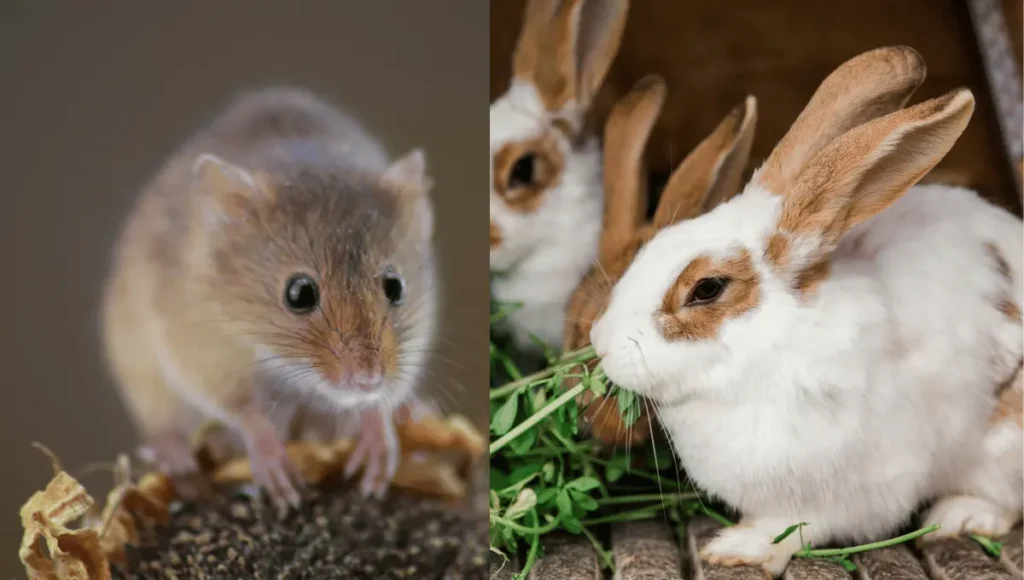
Herbivorous Nature of Rabbits
Rabbits are herbivores, meaning their diet consists exclusively of plant-based foods. In the wild, rabbits primarily consume grasses, leaves, and other vegetation.
Their digestive systems are specifically designed to process large amounts of fiber, which they obtain from their plant-based diet.
Unlike omnivores or carnivores, rabbits do not have the physical adaptations needed to digest meat or animal matter efficiently.
Their teeth, for example, are flat and well-suited for grinding plant material, rather than tearing flesh.
Additionally, a rabbit’s digestive tract is long and complex, designed to extract as much nutrition as possible from fibrous plants. This system includes a cecum, where fermentation of plant material occurs, allowing rabbits to extract necessary nutrients.
Therefore, the idea that rabbits might eat mice is contrary to their natural dietary habits and physical adaptations. Understanding this helps clarify why rabbits are not naturally inclined to consume any form of animal protein.
Myths and Misconceptions About Rabbit Diet
| Myth/Misconception | Reality | Explanation |
| Rabbits are omnivores. | Rabbits are strict herbivores. | Rabbits naturally consume a diet of plants, hay, and vegetables. Their digestive system is designed specifically for processing high-fiber plant foods. |
| Rabbits can eat meat occasionally. | Rabbits should not eat meat at all. | Rabbits lack the necessary enzymes and digestive structure to break down meat, which can cause severe digestive issues. |
| Rabbits need a varied diet, including animal protein. | Rabbits only need a variety of plant-based foods. | A balanced diet for rabbits includes different types of hay, vegetables, and occasional fruits, providing all necessary nutrients without animal protein. |
| Rabbits can eat anything they find. | Rabbits are selective and should only eat safe, plant-based foods. | While rabbits may nibble on various objects out of curiosity, it’s crucial they only consume foods that are safe and beneficial to their health. |
| Rabbits can digest small amounts of animal matter. | Rabbits cannot digest animal matter effectively. | Their digestive systems are specialized for plant material, and consuming animal matter can lead to serious health complications. |
Do Rabbits Eat Mice?
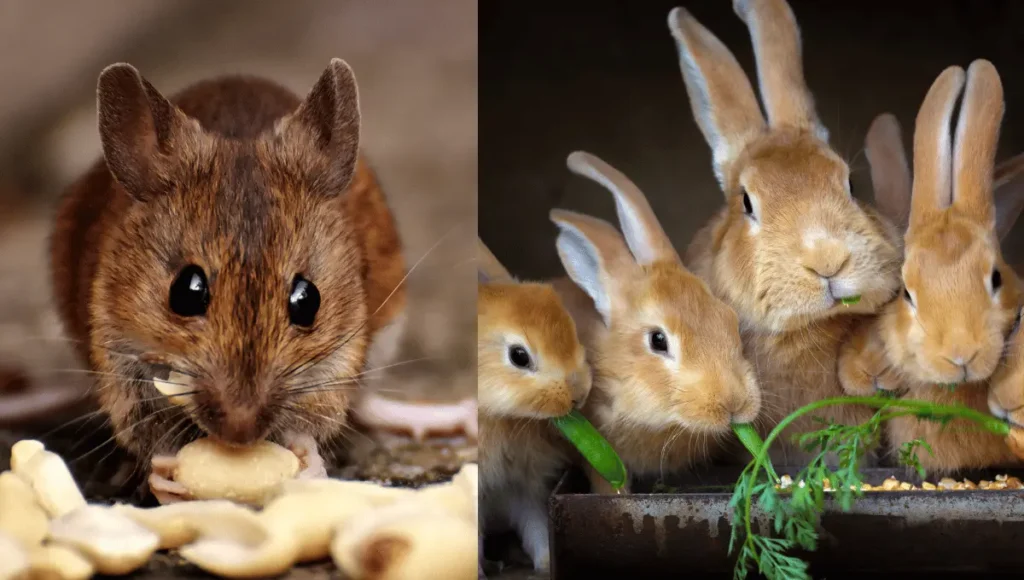
Natural Behavior of Rabbits
Rabbits are prey animals by nature, which means they are more likely to flee from danger than to confront it.
Their instincts are centered around survival, avoiding predators, and finding food sources that align with their herbivorous diet.
This behavior is evident in both wild and domesticated rabbits. They are not hunters, nor do they exhibit any predatory behavior typical of animals that consume meat.
Rabbits rely on their strong sense of smell and hearing to detect danger, which includes avoiding potential predators like mice. In a natural environment, rabbits are more likely to see mice as fellow small creatures rather than a food source.
Their diet and behavior are deeply rooted in their biology, which is geared towards eating plants and avoiding predators rather than engaging in predatory behavior themselves.
Do Rabbits Eat Mice in the Wild?
In the wild, rabbits adhere strictly to their herbivorous diet. There is no documented evidence of rabbits actively hunting or eating mice. Wild rabbits graze on grasses, herbs, and sometimes bark and twigs during the colder months when vegetation is scarce.
The idea that a wild rabbit would consume a mouse is highly unlikely, as their digestive system is not equipped to process meat.
The only possible exception could be extremely rare cases where a rabbit might accidentally ingest a small amount of animal matter while eating vegetation.
However, this would not be a deliberate act of hunting or consuming mice. Wild rabbits are much more concerned with finding enough plant material to sustain themselves, rather than seeking out other animals as a food source.
Instances of Unusual Behavior
There are rare cases where a rabbit might display unusual behavior, such as nibbling on non-plant material, but this is not the norm. Such behavior can often be attributed to factors like stress, boredom, or nutritional deficiencies.
For instance, if a rabbit is not receiving the proper amount of fiber in its diet, it might start chewing on objects that it normally wouldn’t, but even then, the consumption of animal matter is exceedingly rare.
It’s important for rabbit owners to recognize these behaviors as signs that something might be wrong with their rabbit’s environment or diet.
If a rabbit is showing interest in non-plant materials, including animal matter, it may be a signal that they need more enrichment or dietary adjustments.
Consulting with a veterinarian is crucial in these situations to ensure the rabbit’s health and well-being.
How to Ensure Your Rabbit’s Health and Safety
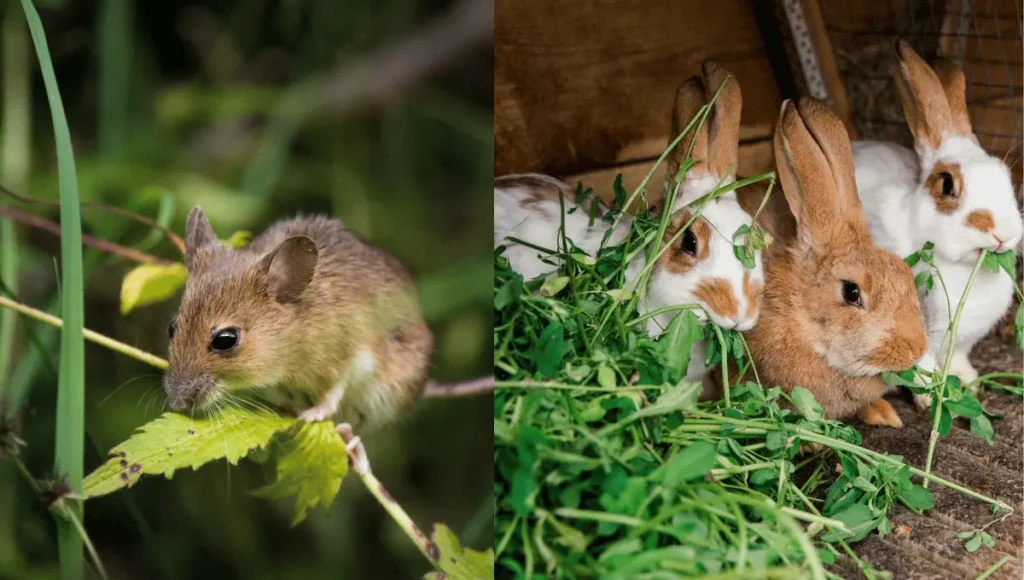
Providing a Balanced Diet
A balanced diet is crucial for maintaining a rabbit’s health and ensuring they stick to their natural eating habits. The cornerstone of a rabbit’s diet should be high-quality hay, which provides the necessary fiber to keep their digestive system functioning properly.
Fresh vegetables, such as leafy greens, can also be included daily, along with a small number of pellets specifically formulated for rabbits. These pellets should be high in fiber and low in protein and fat.
In addition to hay and vegetables, rabbits need a constant supply of fresh water. Providing a variety of vegetables not only ensures they get a range of nutrients but also keeps their diet interesting and enriching.
It’s essential to avoid feeding rabbits any processed human foods, sugary treats, or foods that are high in carbohydrates, as these can lead to obesity and other health issues.
By sticking to a diet that closely mirrors what rabbits would eat in the wild, you can help prevent any abnormal behavior, such as chewing on non-food items, and ensure your rabbit remains healthy and content.
Recognizing and Addressing Abnormal Behavior
Rabbits are creatures of habit, and any significant change in their behavior can indicate a problem.
If a rabbit begins to show interest in non-plant materials or displays signs of stress, such as excessive chewing, aggression, or withdrawal, it’s crucial to take action.
Stress in rabbits can be caused by various factors, including changes in their environment, lack of mental stimulation, or improper diet.
To address these issues, first, evaluate the rabbit’s diet to ensure they are receiving the correct balance of fiber, vitamins, and minerals.
Enrichment activities, such as providing chew toys, tunnels, and safe areas to explore, can help alleviate boredom and stress.
Additionally, ensure that your rabbit has a quiet, safe space where they can retreat if they feel threatened or overwhelmed.
If abnormal behavior persists, it’s important to consult with a veterinarian who can assess the rabbit’s health and provide guidance on any necessary dietary adjustments or behavioral interventions. Early intervention can prevent minor issues from developing into more serious health problems.
How to Get Rid of Mice When You Have Rabbits
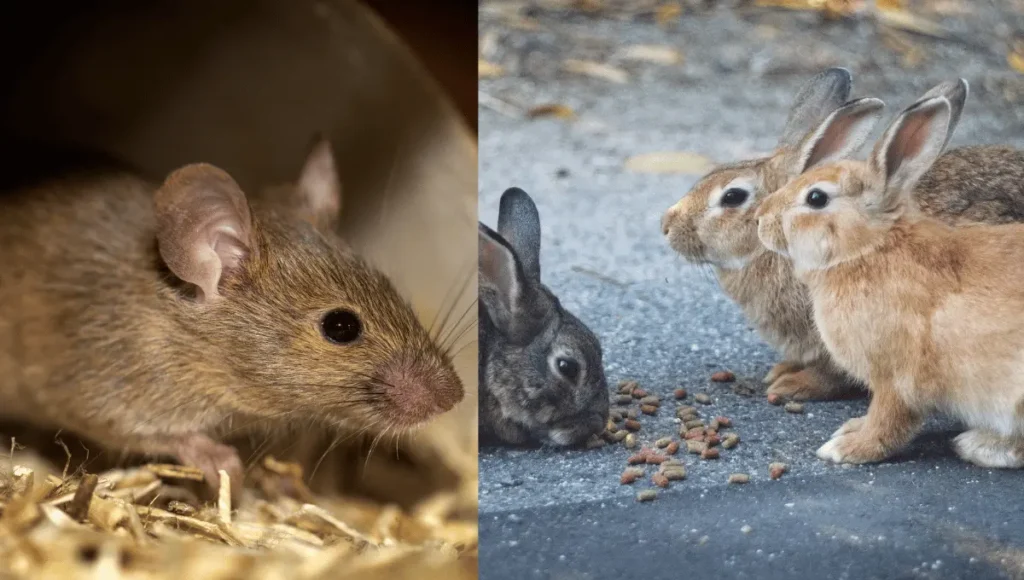
Safe and Rabbit-Friendly Methods
If you have both rabbits and a mouse problem, it’s important to use methods that won’t harm your pets. Traditional rodenticides and traps can be dangerous for rabbits, as they may accidentally ingest poison or get caught in a trap. Instead, consider using non-toxic, rabbit-safe solutions.
One effective method is to use humane traps that catch mice without killing them. These traps allow you to release the mice far from your home, reducing the risk of them returning. Additionally, maintaining a clean environment by removing food scraps, sealing trash cans, and storing rabbit food in airtight containers can help deter mice from entering your home.
Another approach is to use natural repellents, such as peppermint oil or ultrasonic devices, which can deter mice without posing any risk to your rabbits. These methods are safe, humane, and effective in keeping your home mouse-free without endangering your pets.
What to Avoid
| What to Avoid | Reason | Explanation |
| Poison Baits | Highly toxic to rabbits. | Rabbits can accidentally ingest these baits, leading to potentially fatal poisoning. Avoid using poison baits in any area accessible to rabbits. |
| Snap Traps | Risk of injury or death to rabbits. | Snap traps can easily injure or kill a rabbit if they accidentally trigger the trap while exploring. |
| Chemical Sprays and Repellents | Harmful to rabbit’s respiratory system. | Many chemical sprays contain toxic substances that can irritate or damage a rabbit’s delicate respiratory system. |
| Glue Traps | Inhumane and dangerous for rabbits. | Glue traps cause suffering for any animal caught, including rabbits. They can lead to severe injury or stress if a rabbit becomes stuck. |
| Human Food or Sugary Treats | It can cause digestive issues and obesity. | Foods high in sugar, fats, or carbohydrates are not suitable for rabbits and can lead to serious health issues such as obesity and digestive problems. |
Conclusion
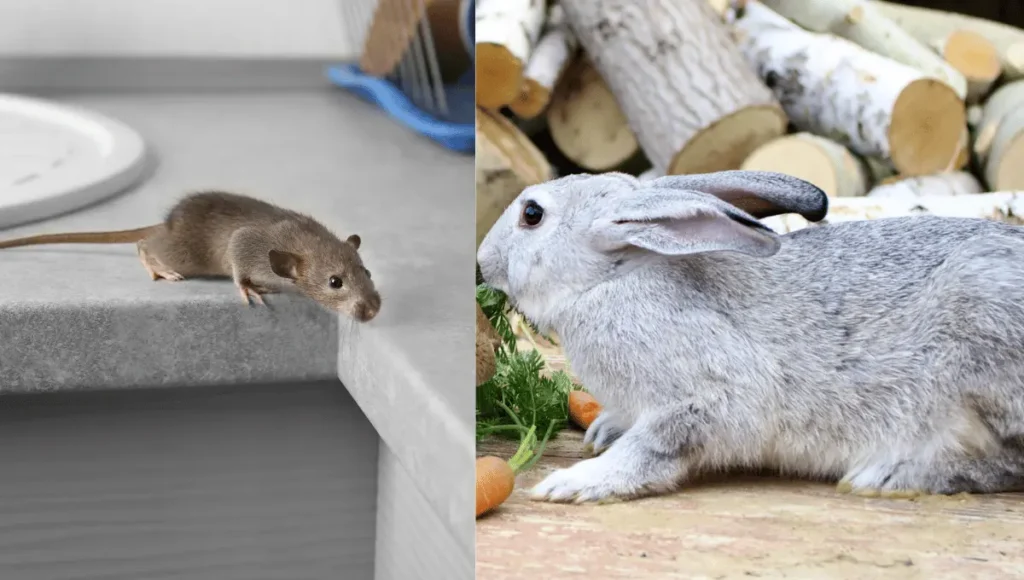
In conclusion, the question “Do rabbits eat mice” can be definitively answered: No, rabbits do not naturally eat mice.
They are strict herbivores with a diet that revolves around plants, not animal matter. While there may be rare instances of unusual behavior due to stress or nutritional deficiencies, these are exceptions rather than the rule.
Understanding your rabbit’s dietary needs and natural behaviors is essential for ensuring their health and happiness.
When dealing with mice in a home where rabbits reside, it’s crucial to use safe and humane methods that protect all animals involved.
By providing a balanced diet, recognizing signs of stress, and using rabbit-friendly mouse control methods, you can maintain a happy and healthy environment for your rabbit.
FAQs
Can rabbits eat meat or animal products?
No, rabbits are strict herbivores and should only consume plant-based foods like hay, vegetables, and some fruits. Meat or animal products can cause serious digestive issues.
Why might someone think rabbits eat mice?
This misconception might arise from misunderstandings about a rabbit’s diet or from observing other animals that are omnivores. However, rabbits are not predators and do not eat mice.
What should I do if my rabbit shows unusual behavior, like chewing on non-food items?
If your rabbit is chewing on non-food items, it may be a sign of stress or dietary deficiencies. Ensure they have a balanced diet and plenty of enrichment activities, and consult a veterinarian if the behavior continues.
Is it safe to use poison baits to get rid of mice if I have a rabbit?
No, poison baits are highly toxic to rabbits and should be avoided. Instead, use humane traps and natural repellents that are safe for your rabbit.
What is the best diet for a pet rabbit?
A pet rabbit’s diet should consist mainly of high-quality hay, fresh vegetables, and a small amount of specially formulated rabbit pellets. Fresh water should always be available.
